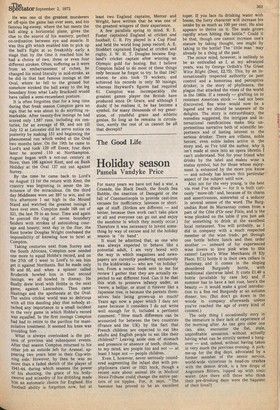The Good Life
Holiday season
Pamela Vandyke Price
For many years we have not had a war, a Crusade, the Black Death, the South Sea Bubble, the exaction of Danegeld or the fall of Constantinople to provide cast-iron excuses for inefficiency, lateness or shortage of staff. (Strikes are different — and better, because then work can't take place at all and everyone can go out and enjoy the sunshine in which they mostly occur.) Therefore it was necessary to invent something by way of excuse and lo! the holiday season is 'to hand '.
It must be admitted that, as one who was always expected to behave like a potential adult, I am very bored with the way in which magazines and newspapers are currently pandering exclusively to the kiddiwinks — who are 'on holiday' too. From a recent book sent to me for review I gather that they are actually expected to eat different food. Can it be that this wish to preserve infancy under, as 'twere, a belljar, or stunt it forever like a Japanese tree, is because the parents themselves hate being grown-up so much? Years ago now a paper which I dare not name because it considers I do not write well enough for it, included a pertinent comment: "How much difference can be accounted for between the two countries (France and the UK) by the fact that French children are expected to eat like adults and English people to eat like their children?” Leaving aside size of stomach and presence or absence of teeth, children, to my mind, are people too and not — at least I hope not — people children.
Even I, however, never seriously considered augmenting the infant diet with prephylloxera claret or 1921 hock, though a recent note about animal life in Medical News-Tribune could change the entire pattern of tot tipples. For, it says, " The hamster has proved to be an excellent toper. If you lace its drinking water with booze, the furry character will increase his intake by as much as 100 per cent. He also appears to thrive on it. The male grows rapidly when hitting the bottle." Could it be that, though one cannot increase one's stature by taking thought, one might by taking to the bottle? The 'little man' may already be a thing of the past.
The minor mind, however, is unlikely to be as enthralled as I, at my advanced years, was by George Ordish's The Great Wine Blight (Dent, £2.75). This, by an internationally respected authority on pest control and a humorous and perceptive drinker, is the story of phylloxera, the plague that attacked the vines of the world in the 1860s. If a remedy — grafting on to resistant American stock — had not been discovered, fine wine would now be a legend and we should be unaware of its delights. The story is extraordinary, the remedies suggested, the intrigues and international ramifications make this unpretentious narrative both of scientific importance and of lasting interest to the serious drinker. There are villains, noble heroes, even noble ladies active in the story and, as I've told the author, why it isn't made at once into an opera libretto I can't understand. Not for your friend who drinks by the label and makes wine a status symbol, but for those whose enjoyment is enhanced by the more you know — and nobody has known this particular aspect of the subject until now.
Also not for the very young, is the best yin rose I've drunk — for it is bot'h curiously ' more-ish ' and, because of its charm and assertiveness, somewhat of a seducer in several senses of the word. The Burgundian Rose de Marsannay comes from a part of the Ceite d'Or near Fixin, and is the wine plonked on the table if you just ask for something to drink at the excellent local restaurant. You will probably, as I did in company with a much respected member of the wine trade, get through one bottle before lunch and then order another — unheard of for experienced wine lovers to love pink wine to this extent! Layton's Wine Merchants (8 Ely Place, EC1) bottle it in their own cellars in Santenay, and it comes in the sloping shouldered Burgundy bottle, with traditional slantwise label. It costs £1.40 a bottle (available by case lot) and if summer has to have a last rose, here's the beauty — it would make a good introduction to a fine red Burgundy at an autumn dinner, too. (But don't go down in the woods in company afterwards unless you've reached the age of every kind of consent.) The only thing I occasionally envy in the immature is their lack of experience of the morning after. As one gets older one can, alas, encounter the flat, stale, unprofitable sensation without actually having what can be strictly termed a hangover — and, indeed, without having taken in very much the previous evening. A pickme-up for the dog days, advocated by a former member of the senior service, world-wide victorious in head-on crashes with the demon drink, is a few drops of Angostura Bitters, topped up with tonic water. (Are there still those who think their pre-drinking days were the happiest of their lives?)






































 Previous page
Previous page